The Best Home Blood Pressure Monitors of 2026
We tested the best at-home blood pressure monitors on the market, looking at factors like ease of use, accuracy, and data tracking.

- We chose the Oxiline Pressure XS Pro as the best blood pressure monitor for home use for its easy data sharing, advanced features, and accuracy.
- Blood pressure monitors in this review range from $69–$169.
- Over time, high blood pressure can increase the risk of stroke, heart disease, and kidney problems. Regularly checking your blood pressure is one of the best ways to stay on top of your health.
To support everyone’s right to age well, we research, test, and recommend products so you can find the right options to help you live your healthiest life. We’ve spent over 50 hours conducting in-depth, hands-on research and testing eight home health monitoring devices from seven brands to help you make an informed decision. To find the best home blood pressure monitors, we:
- Examined and mystery-shopped the top home health monitor brands and products, including blood pressure monitors
- Consulted registered nurses and board-certified doctors to fully understand the importance and process of monitoring your blood pressure from home, and determine key features to look for in a device
- Personally tested blood pressure monitors, comparing them in key factors such as ease of use, fit, display, accuracy, and data tracking
- Researched and reviewed articles and guidelines from reputable health organizations, such as the American Heart Association, to learn about the risk factors related to high blood pressure, lifestyle changes to lower blood pressure, and the importance of understanding and tracking blood pressure
- Combed through verified customer reviews of blood pressure monitors on the company and third-party seller websites
We’re constantly testing new blood pressure monitors to continue to share the most accurate and up-to-date recommendations. Read more about our blood pressure device review methodology.
High blood pressure, or hypertension, is a common condition affecting nearly half of adults nationwide.1 Uncontrolled or undetected high blood pressure increases the risk of having a stroke, heart attack, vision loss, and kidney disease.2 In most cases, hypertension does not cause symptoms. So regular blood pressure monitoring can help you stay on top of your health.
If you’ve already been diagnosed with hypertension, using a home blood pressure monitor can help you get more accurate readings and track your response to treatment. When used with methods to lower your blood pressure, a home-use monitor can help protect your health. But not all devices are created equal. When choosing the best home blood pressure monitor for your needs, prioritize accuracy while considering factors such as ease of use, additional features, and comfort. Read on to see which systems our team recommends.

Wrist and finger blood pressure monitors aren’t included in our top picks because the American Heart Association does not recommend them.
Oxiline Pressure XS Pro
Best OverallHoliday Discount:
Up to 50% off sitewide - no code needed

Holiday Discount:
Up to 50% off sitewide - no code needed
- Easy to use
- Accurate, consistent readings
- Lifetime warranty
Our picks for the best blood pressure monitors of 2026
- Oxiline Pressure XS Pro: Best Overall
- Oxiline Pressure 9S Pro: Best for Beginners
- Omron Series 3: Best Value
- VitalTrack Pro: Easiest to Use
Comparing the best blood pressure monitors of 2026
| Comparison Features | ||||
|---|---|---|---|---|
| Our rating (out of 10) | 9.9 |
9.8 |
9.5 |
9.5 |
| Power options | Battery and USB-C |
Battery and USB-C |
Disposable batteries |
Battery and USB-C |
| Number of users | Unlimited |
3 (2 users and a guest mode) |
1 |
2 |
| Number of readings stored | Unlimited |
200 per user |
14 |
100 per user |
| Easy data sharing | Yes |
No |
Yes |
No |
| Irregular heartbeat detection | Yes |
Yes |
Yes |
Yes |
| Average reading time (in seconds) | 34 |
44 |
33 |
28 |
Oxiline Pressure XS Pro Blood Pressure Monitor: Best Overall
We selected the Oxiline Pressure XS Pro as Best Overall Blood Pressure Monitor for its advanced features, including Bluetooth connectivity and a personal health app. The device is easy to use and features Oxiline’s VIBRA™ TX Sensor, the brand’s latest technology for improved accuracy.
Oxiline Pressure XS Pro
Best OverallHoliday Discount:
Up to 50% off sitewide - no code needed
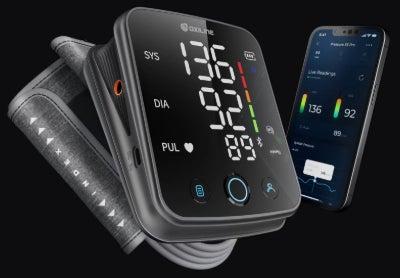
Holiday Discount:
Up to 50% off sitewide - no code needed
- Learn more in our Oxiline blood pressure monitors review
- Power source: Battery and USB-C
- Number of users stored: Unlimited
- Warranty: Lifetime
- Reading memory: 99 per user (unlimited storage in the app)
- App available: Yes
- Health metrics measured: Blood pressure, pulse, and irregular heartbeat
- Weight: 13 oz
- Cuff size: 8.7–16.5 inches (standard); 8.6–18.9 inches (XL)
Pros
- A user-friendly app allows you to see different data views
- Unlimited users and reading storage through the app
- Can export data to a PDF via the app
- Irregular heart rate detection
- In-app blood pressure reminders
Cons
- Sometimes syncing the app with the device’s readings is delayed
- Slightly bulky
Why we chose Oxiline Pressure XS Pro as the Best Overall
The Oxiline Pressure XS Pro blood pressure monitor has a clear, easy-to-read screen. It tracks your blood pressure, pulse, and any irregular heart rhythms (also called arrhythmias). The device uses Bluetooth to connect with Apple and Android phones through Oxiline’s free app. The app allows unlimited data storage and can be used by multiple people. You can view live readings and track your results over time with daily, weekly, monthly, six-month, and yearly graphs. These graphs can be downloaded as a spreadsheet and shared with your doctor. These features are why we found the Oxiline Pressure XS Pro to be the best blood pressure monitor for home use.
The Oxiline Pressure XS Pro stands out for its VIBRA™ TX Sensor, which is more advanced than the one in the 9S Pro. This technology is embedded in the blood pressure cuff. The device displays a warning symbol if it detects body motion, as even small movements can prevent accurate readings. These features may make it a better choice for people with diagnosed high blood pressure compared to someone who wants to monitor their blood pressure more casually.
The Oxiline Pressure XS Pro blood pressure monitor comes with two blood pressure cuffs: standard and XL. The standard cuff fits arms from 8.7–16.5 inches around. The XL cuff fits 8.6–18.9 inches. It runs on four AA batteries (included) and also has a USB-C plug for wall charging.
Our testing experience with the Oxiline Pressure XS Pro
Our testers say the Oxiline Pressure XS Pro device is simple to use and provides accurate measurements. The user manual is straightforward, which makes setup and use of the armband easier. “It was very easy to take a reading. I think that most users would be able to put on the armband and take a reading without assistance. The display is large and clear,” said one of our testers.
The app is also easy to use, and we liked being able to see live readings.
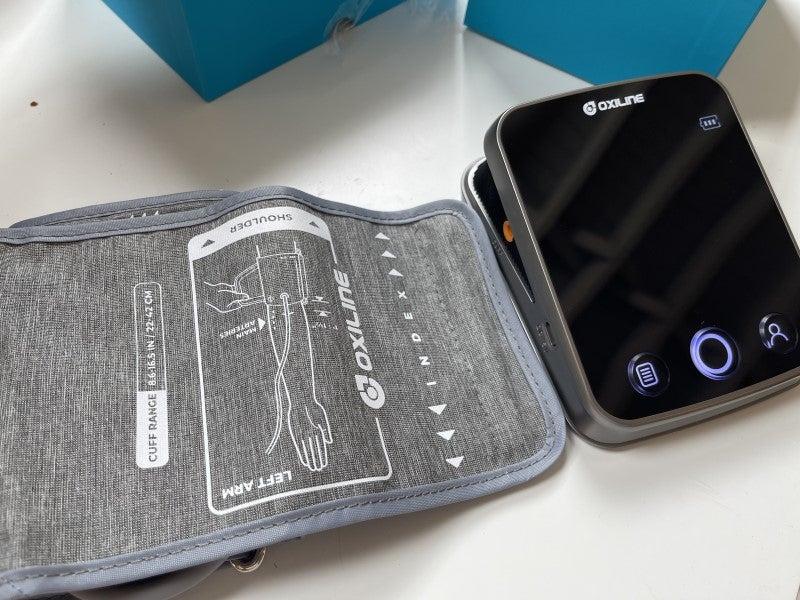
Our testers found the Oxiline XS Pro Blood Pressure monitor to be similar to the previous X Pro version. “This was overall a bit nicer material and came with a carrying case. But the product dimensions and functions seem to be about the same,” said one of our testers.
But the new device’s display was a significant improvement, with larger numbers, a brighter screen, and the World Health Organization (WHO) color-coded bar on the side for easy identification of a high reading. Like the 9S Pro, the XS Pro now allows for a third (guest) user to use the device.
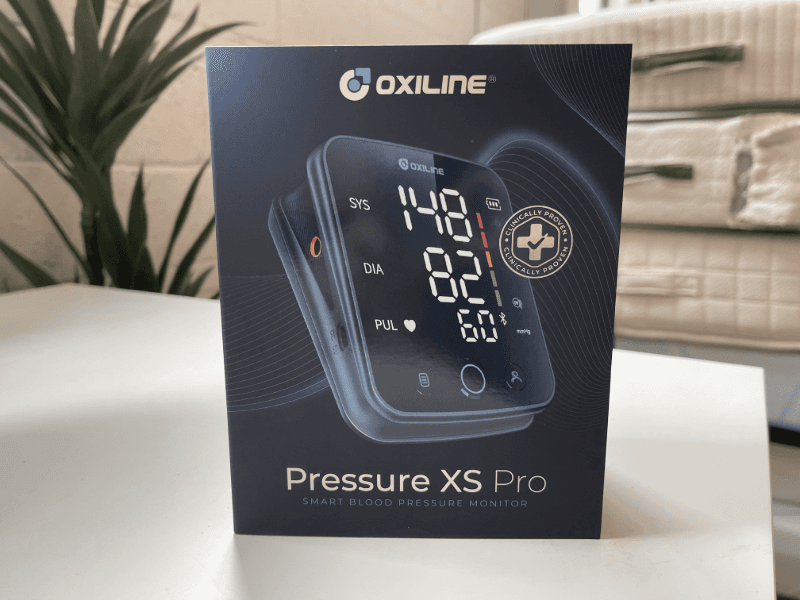
For those who want to track their readings in the app and have an easy way to share those results with their health care professional, the XS Pro is a worthy upgrade to the 9S Pro device. While our testers liked both the Oxiline devices, it was this convenient app that elevated the XS Pro to the best blood pressure monitor for home use.
The Oxiline customer experience
- Warranty and trial period: Oxiline devices can be returned within 30 days of delivery for a full refund. Oxiline products come with a limited lifetime warranty. The warranty covers defects in materials or workmanship under normal use.
- Financing: No
- Customer service: If you need additional assistance, you can visit the Oxiline customer support page to fill out an online contact form, call, or send an email.
- Phone: 833-694-5463, Monday through Friday from 9 a.m. to 5 p.m. ET
- Email: support@oxiline.shop
- Live chat: The Oxiline website also has a live chat feature, available Monday through Friday from 10 a.m. to 5 p.m. ET.
Oxiline Pressure 9S Pro BP Monitor: Best for Beginners
We chose the Oxiline Pressure 9S Pro as our Best Blood Pressure Monitor for Beginners due to its simple, user-friendly design and accurate results. We also liked its large, easy-to-read numbers, well-lit display, and use of the brand’s VIBRATM T95 Sensor to detect arterial vibrations and adjust for accuracy.
Oxiline Pressure 9S Pro
Best for BeginnersHoliday Discount:
Up to 50% off sitewide - no code needed
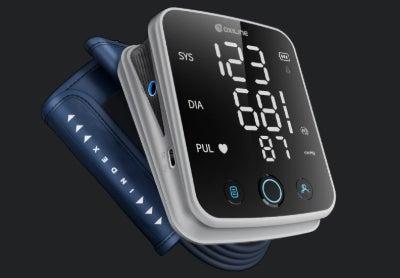
Holiday Discount:
Up to 50% off sitewide - no code needed
- Learn more in our Oxiline blood pressure monitors review
- Power source: Battery and USB-C
- Number of users stored: Two primary and a guest
- Warranty: Lifetime
- Reading memory: 200 readings per user
- App available: No
- Health metrics measured: Blood pressure, pulse, irregular heartbeat
- Weight: 14.4 oz
- Cuff size: 8.7–16.5 inches around
Pros
- Large display and simple interface
- Abnormal blood pressure indicator
- Compact design
- Stores up to 200 readings per user
- VIBRA T95 Sensor, which checks for arterial vibrations for more accurate readings
Cons
- No Bluetooth connectivity or companion app
- Only shows the average from the past three days.
Why we chose the Oxiline Pressure 9S Pro as Best for Beginners
The Oxiline Pressure 9S Pro has a large display and compact design. It features an adjustable cuff that fits arm sizes 8.7–16.5 inches, like many other home blood pressure monitors. The 9S Pro measures blood pressure and pulse, and identifies an irregular heartbeat. While we were already impressed with the Oxiline 9S Pro Blood Pressure monitor, the new 9S Pro model adds sensors to improve accuracy. It can also detect user movement and improper blood pressure cuff placement, helping users receive more reliable readings. While the 9S Pro no longer features the color-coded indicator showing whether the reading is high or normal, it does have a bar reading along the side, without the color coding.
The Pressure 9S Pro stores up to 200 readings for two people, and now also features a guest reading mode, which doesn’t keep stored readings. This may be useful if a friend or family member wanted to borrow your device to try it out without interrupting your saved data. We like Oxiline’s lifetime warranty and 30-day trial period for easy returns. It runs on four AAA batteries (included) but also has a USB-C port, so you can plug it into a standard outlet.
This device does not have advanced features like Bluetooth capabilities or app connectivity. If these features are important to you, the Oxiline XS Pro or the Omron 3 Series may be a better option. But if you’re among those who want to track your readings and see trends without connecting to a smartphone and downloading an app, this holds all the data you need, stored directly on your device.
Our testing experience with the Oxiline Pressure 9S Pro
Overall, we are impressed with the Oxiline Pressure 9S Pro. Testers rate it 5/5, saying the simplistic design makes it easy to check their blood pressure. “Once the armband is on, it is as easy as pressing one button. The start button is bold and stands out,” said one tester.
It’s extremely easy to get a reading. Once you get the cuff on and hit the button, it begins right away. Your results stay on the screen for about 45 seconds. It also has bars on the side that dictate if your blood pressure is normal. You can refer to the manual to see what number of bars correlates to your levels.”
-One of our testers on using the Oxiline 9S Pro
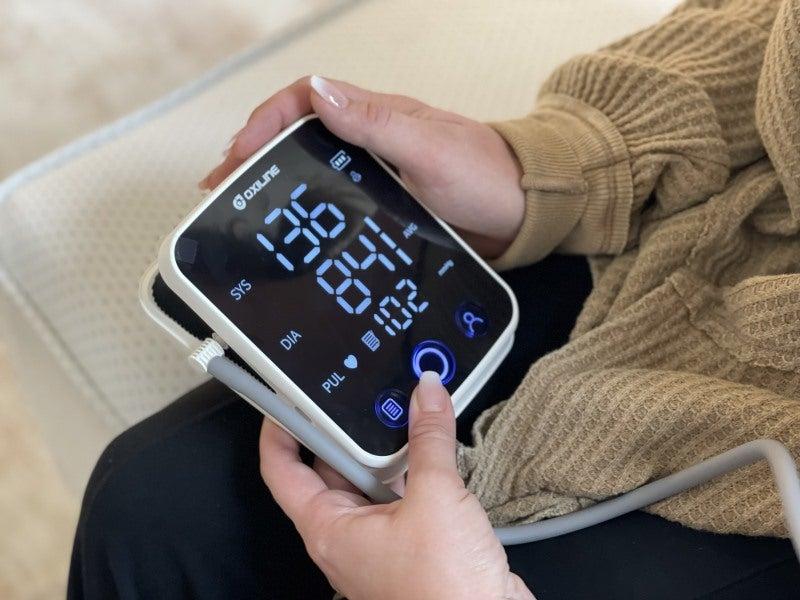
Our testers found the Oxiline 9S Pro easier to use than the previous 9 Pro device because of the manual’s improved text size and easy setup. “It was very easy to get on by myself. I don't think many people would need assistance. There are no small clips or fasteners that someone with mobility issues may need help with,” one of our testers said, after taking a first reading with the Oxiline 9S Pro.
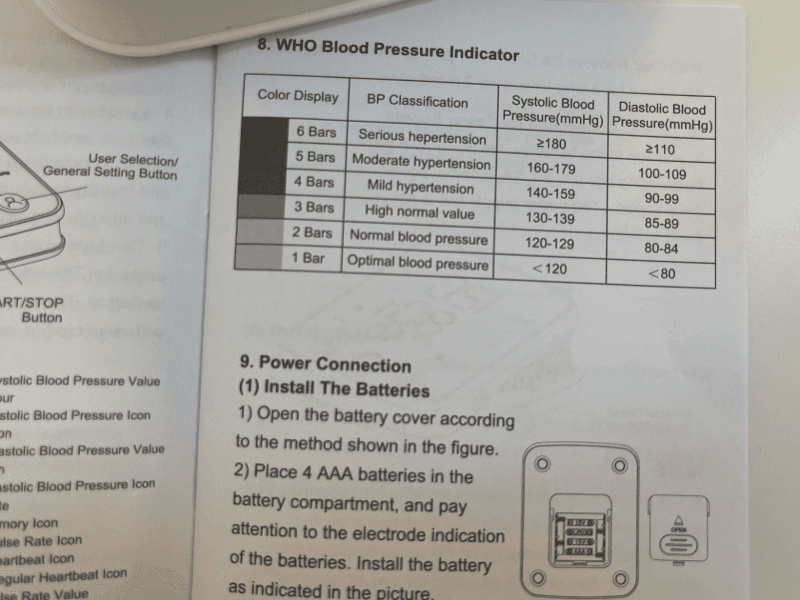
Our testers also appreciated the simplistic design and overall user experience of the 9S Pro, especially for those who aren’t interested in connecting with an app. “Overall, this product is great for the price. For $100 [on sale at the time], and a lifetime warranty, it makes me think it's a good value. It was an easier product to use, the user manual was clear and concise,” said one tester, summarizing their experience with the Oxiline 9S Pro. You can learn more in our Oxiline blood pressure monitor review.
“This is a super simple and basic device. It’s not very heavy, and I think anyone could benefit from and feel confident in this device.” —Tester
The Oxiline customer experience
- Warranty and trial period: Devices can be returned within 30 days of delivery for a full refund. Oxiline products come with a limited lifetime warranty. The warranty covers defects in materials or workmanship under regular use.
- Financing: No
- Customer service: If you need additional assistance, you can visit the Oxiline customer support page to fill out an online contact form, call, or send an email.
- Phone: 833-694-5463, Monday through Friday from 9 a.m. to 5 p.m. ET
- Email: support@Oxiline.shop
- Live chat: The Oxiline website also has a live chat feature, available Monday through Friday from 10 a.m. to 5 p.m. ET.
Omron 3 Series Upper Arm Blood Pressure Monitor: Best Value
Starting at $70 before discounts, the Omron 3 Series stands out as our Best Value Blood Pressure Monitor. The device has a simple, easy-to-read display. It includes features such as Bluetooth connectivity and a companion app, typically found in higher-end models.
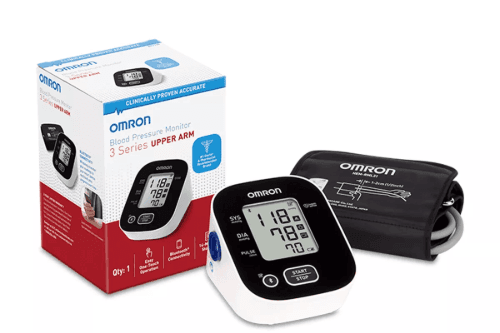
- Learn more in our Omron blood pressure monitors review
- Power source: Disposable batteries
- Number of users stored: One
- Warranty: One year for cuff, two years for monitor
- Reading memory: 14 on device
- App available: Yes
- Health metrics measured: Blood pressure, pulse, and irregular heartbeat
- Weight: 8.8 oz
- Cuff size: 9–17 inches
Pros
- Easy to use
- Large display
- Can connect to a mobile app
- Blood pressure reminders
Cons
- Must pay for full access to the app
- Only tracks readings for one user
- Difficult to wrap the cuff around the arm
- Limited 14-day return window
Why we chose Omron 3 Series as Best Value
The Omron 3 Series upper-arm blood pressure monitor is the least expensive one we reviewed. The device features a simple, user-friendly design and Bluetooth connectivity. It runs on four AA batteries (not included) but does not offer a plug-in power option like other brands.
The Omron comes with one adjustable blood pressure cuff and stores up to 14 readings for one person. Users can download Omron’s free app for tracking and unlimited data storage. The app has a feature that allows you to set daily reminders to check your blood pressure. We like that it can send data to your primary care provider or anyone else directly from the app. This can be sent as an Excel or CSV file. The app’s basic features are free, but advanced tools like medication tracking and personalized insights require a $13.49 monthly subscription.
The display screen shows blood pressure and pulse. It’s not color-coded but does display a symbol for high blood pressure and irregular heartbeat readings.
The Omron 3 Series upper-arm blood pressure monitor is the only device in our review listed on the U.S. Blood Pressure Validated Device Listing (VDL) website. VDL is a program created by the American Medical Association to confirm the accuracy of blood pressure monitors through independent testing.
Our testing experience with Omron 3 Series
During testing, the Omron 3 Series gave consistent, accurate readings and fit well. Testers say the app is easy to navigate and pair with the device. The user manual has a quick start guide with large text and pictures for easy setup.
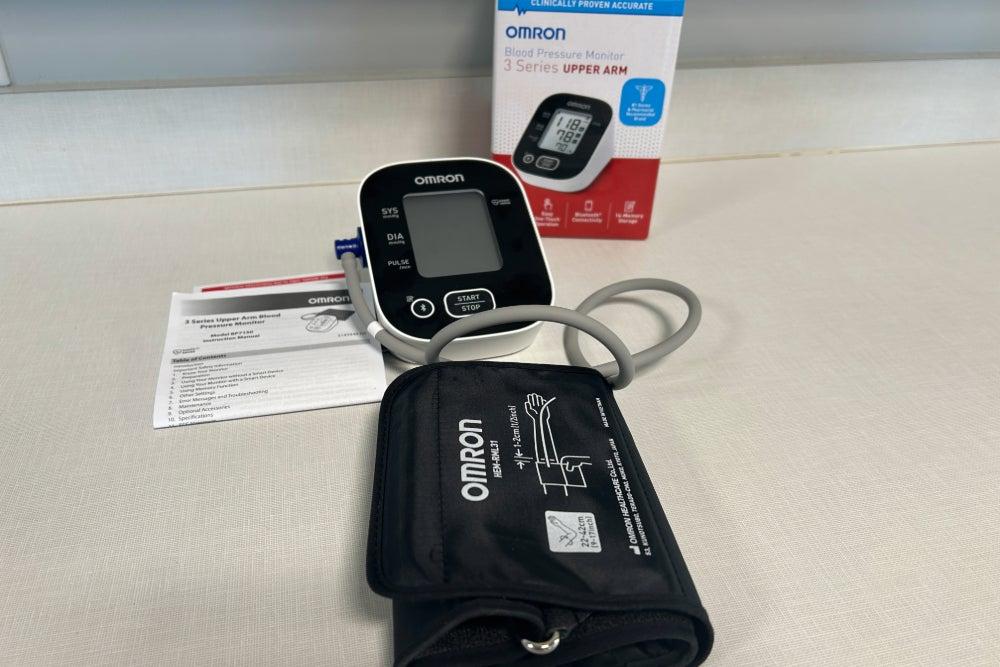
Some testers had a hard time putting the cuff on by themselves. If you’re considering purchasing this device, it might help to have someone assist you the first time you use it.
“The cuff was hard to get into place by myself, but once it was in place, I was able to get a reading quickly,” one tester noted.
We like that the numbers are large and easy to read with a light background. But there’s no backlight, which may make it hard to see the screen in the dark. To learn more about the brand's other blood pressure monitors, check out our Omron review.
“The Omron 3 Series is very simple, which makes it easy to use. If you don't want to mess with the app, you don't need to. It will just take your BP and store the last 14 measurements, but if you want the extra tracking and other information, it's there for you in the app.” — Tester
The Omron customer experience
- Warranty and trial period: Omron products must be purchased through an authorized retailer like Best Buy, CVS, or Target. The return policy will depend on where the device was purchased. The monitor has a two-year limited warranty, and the cuff is covered for one year. The warranty applies to defects in materials or workmanship under normal use.
- Financing: Varies depending on the seller
- Customer service: If you need additional assistance, you can visit the Omron customer support page to fill out an online contact form, call, or send an email.
- Phone: 866-216-1333, Monday through Friday from 8:30 a.m. to 4:30 p.m. CT
- Website: Fill out an online contact form
The Omron website has a live chat option, but we were unable to connect with a real person. We were connected with a chatbot and asked to leave our information so an agent could follow up later.
VitalTrack Pro Blood Pressure Machine: Easiest to Use
We chose the VitalTrack Pro as our Easiest-to-Use Blood Pressure Monitor because of its clean, simple design. It gave us accurate readings during testing and comes with a generous 90-day trial period.
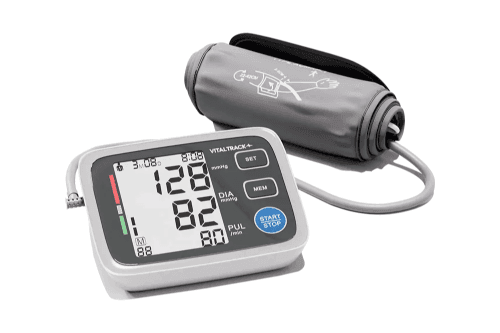
- Power source: Battery and AC adapter
- Number of users stored: Two
- Warranty: 10 years
- Reading memory: 90 per user
- App available: No
- Health metrics measured: Blood pressure, pulse, and irregular heartbeat
- Weight: 14 oz
- Cuff size: 8.7–16.5 inches, stretchable
Pros
- Basic design is easy to use
- Long warranty and trial period
- Stores up to 90 readings for two users
- Voted best blood pressure cuff by testers
Cons
- No back-lit display
- No option to export data
Why we chose VitalTrack Pro as Easiest to Use
The VitalTrack Pro blood pressure machine is easy to set up and use. It includes a stretchable cuff designed to fit arms from 8.7–16.5 inches around. The device uses a hospital-grade sensor to provide accurate readings.
Testers say the Velcro on the cuff is sticky and clings to itself easily, making it simple to wrap around the arm. They agreed that the VitalTrack Pro had the best blood pressure cuff of the devices we tested. The display on the monitor is easy to read with large print. It shows your blood pressure and pulse, with a color strip on the side of the screen that shows whether your result is normal, elevated, or high.
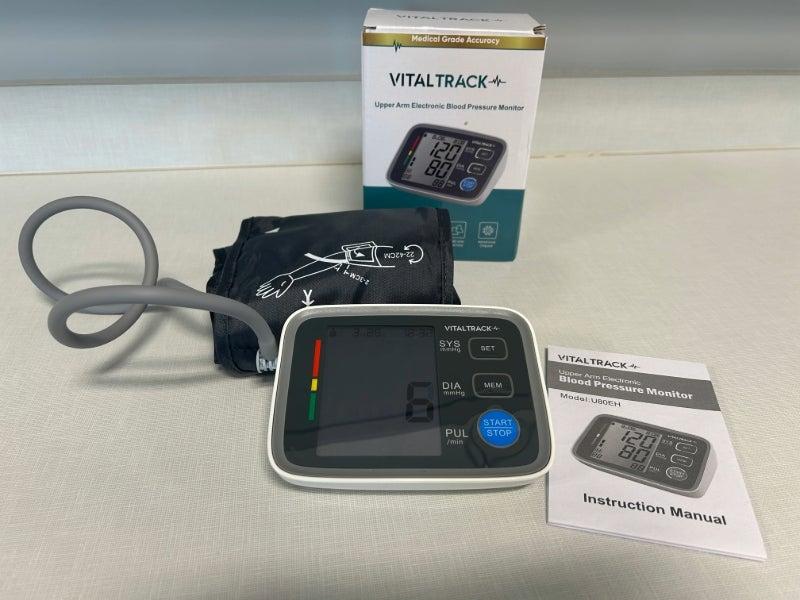
The VitalTrack Pro blood pressure machine doesn’t have Bluetooth or app connectivity but stores up to 90 readings for two users. There is a memory button that displays past readings as well as an average of your last three measurements. It runs on four AA batteries (included) and also has a USB-C port.
This blood pressure monitor stands out for its 90-day trial period. This is much longer than most other brands we’ve reviewed.
Our testing experience with VitalTrack Pro
Testers like the VitalTrack Pro’s simple setup and no-frills design. The user manual is easy to follow, and the cuff is comfortable and fits well. The monitor has no backlight, but testers could see the numbers, even in a dim room.
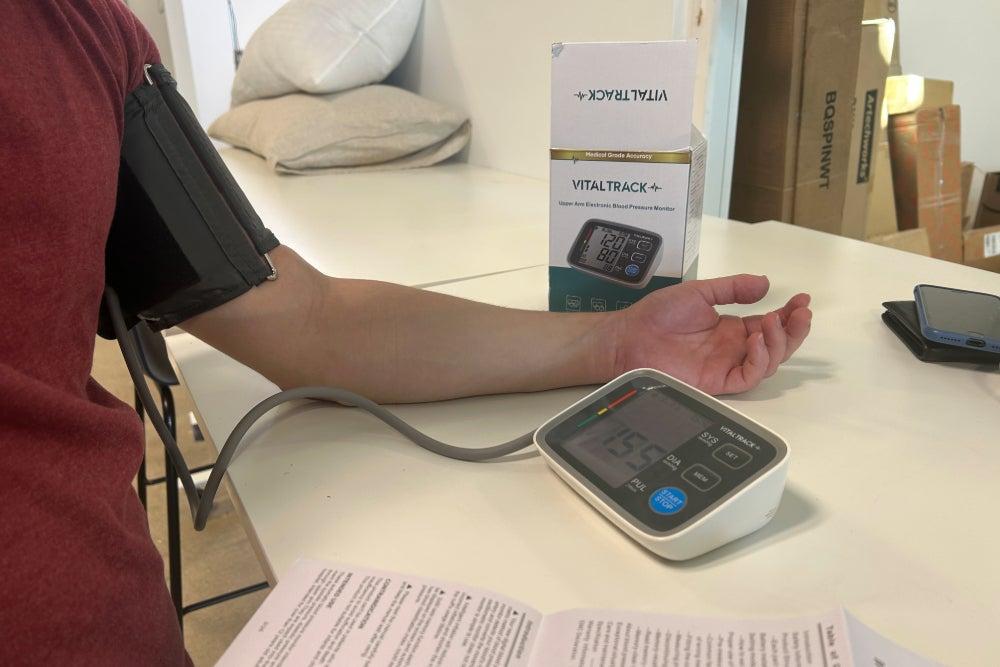
This device may be a good fit for anyone looking for a basic blood pressure monitor with accurate tracking and the ability to store readings.
“I thought the VitalTrack was very straightforward,” said a tester. “It has a simple setup and it’s clear how to use it and how to track your readings. It has some extra features, like blood pressure averaging and the ability to store data for two users but is otherwise very basic.”
The VitalTrack customer experience
- Warranty and trial period: VitalTrack Pro has a 90-day money-back guarantee and a 10-year warranty. The warranty covers defects in materials or workmanship under normal use.
- Financing: No
- Customer service: If you need additional assistance, you can reach Vital Track customer service by phone, email, or online contact form.
- Phone: 833-708-2839, Monday through Wednesday from 9 a.m. to 5 p.m. ET and Friday from 9 a.m. to 5 p.m. ET
- Email: info@vitaltrackusa.com
- Website: Fill out an online contact form
How we test blood pressure monitors
We found several important factors when researching, testing, and reviewing blood pressure monitors, including:
Ease of use
We tested blood pressure monitors that were simple to set up and use. We paid close attention to the clarity of the instructions and to whether the buttons were large and clearly labeled.
Accuracy
According to the American Heart Association, automatic, cuff-style monitors that wrap around your upper arm are the most accurate type of blood pressure monitor.3 Wrist and fingertip monitors may be convenient, but they tend to give less accurate readings. For this review, we focused on testing upper-arm monitors with proven accuracy.
Data sharing
Data sharing can make it easier to communicate readings with your doctor. Depending on your device, you can either share your data directly in the app or print it and bring it to your appointment. We chose devices that can store at least one week’s worth of blood pressure readings. Then we tested both the devices and their data storage and sharing functions.
Cost
We tested monitors that were accurate, easy to use, and reasonably priced. Monitors with basic features generally cost less than systems with advanced features such as Bluetooth pairing and a smartphone app. That’s why it’s important to consider not just the cost, but also which features matter most to you.
Extra features
We include a variety of blood pressure monitors with different features, such as smartphone apps and easy-to-read displays with large numbers. Priority was given to models with a backlit display, which makes it easier to see in low light.
How to check your blood pressure
If you’re not familiar with home blood pressure devices, your doctor or pharmacist can help you get started. Here are some other tips to consider.3
- Avoid smoking, caffeine, and exercise for at least 30 minutes before taking your reading. Make sure your bladder is empty before measuring your blood pressure.
- Sit in a calm, quiet environment with your back supported at least five minutes before taking your blood pressure. Keep your feet flat on the floor and keep your legs uncrossed.
- Remove clothing from the upper arm and place the cuff around one inch above the bend of your elbow. It should be snug but not too tight.
- Rest your arm on a flat surface and refrain from talking while your blood pressure is being measured.
- Take two measurements at least a minute apart in the morning before taking medication and in the evening before bed.
A normal systolic blood pressure (top number) is less than 120 mm Hg. A healthy diastolic pressure (bottom number) is less than 80 mm Hg. High blood pressure is defined as consistent systolic readings of 130 mm Hg or higher or diastolic readings of 80 mm Hg or higher.4
See our blood pressure chart below for an easy visual to understand your blood pressure readings.
Blood pressure chart

Sometimes, blood pressure readings can be higher than normal because of nervousness or fear. Data shows that 1 in 3 people with high readings at the doctor’s office may have regular readings at home.5 This is called white coat syndrome.
Best time to take your blood pressure
According to the American Heart Association (AHA), you should take your blood pressure two times a day. First, take a reading in the morning before taking your medications, then in the evening before going to bed. Each time you take your blood pressure, take two readings 1 minute apart.3 You can use the AHA’s downloadable log to track your daily blood pressure readings.

From our medical advisory board:
The average traditional blood pressure reading takes about 1 minute. Most home monitors take about half that time.
How to choose a blood pressure monitor
Several factors may determine whether a blood pressure monitor is the right fit. Here are some key things to consider:
Accuracy and clinical validation
While the FDA has cleared many pressure monitors as safe, this does not mean they are all accurate.
The FDA does not validate the blood pressure devices it clears for sale. This makes it essential to choose a reliable, tested device. You can also check your monitor’s accuracy by comparing its readings with those of another trusted device. For example, during the device’s warranty period, take it to your doctor’s office and compare readings. We also recommend doing this when you purchase a pulse oximeter or other home health devices.
Ease of use and display readability
Some blood pressure monitors are easier to use than others. Look for devices with clear, easy-to-read monitors and large numbers. Some displays can become overcrowded with data or symbols, which may be confusing, especially if you’re new to these devices.
Cuff size and comfort
The number one mistake people make when measuring their blood pressure is using an incorrect cuff that’s too big or too small. This can lead to falsely elevated or depressed blood pressure readings. To determine your arm size, use a cloth measuring tape to measure the circumference of your upper arm.
Memory storage and multi-user functionality
Many blood pressure monitors store readings, which can be helpful for tracking data over time. If more than one person in your household will be using the device, look for a model that supports multiple users.
Smart features and connectivity options
Some devices use Bluetooth to sync your measurements with a smartphone app. This provides detailed data you can download and share with your health care provider. Other useful features to consider include irregular heartbeat detection and color displays that make results easier to understand.

Portability
If you travel often or are away from home, you'll want to consider factors like size and battery life.
Price considerations
Before shopping for a blood pressure monitor, set a budget and identify features that are important to you. Many devices are both accurate and affordable.
Costs of home blood pressure monitors
The blood pressure monitors in this review cost $69–$169, but prices can vary. In some cases, Medicare will cover the cost of an ambulatory blood pressure monitor (a cuff you wear during the day and night for 24/7 monitoring).6 This typically happens if your readings at the doctor’s office are consistently higher or lower than at home.
Cost comparisons for blood pressure monitors
| Comparison Features | Oxiline Pressure XS Pro  |
Oxiline Pressure 9S Pro  |
Omron Series 3  |
VitalTrack Pro  |
|---|---|---|---|---|
| Cost | $169 |
$99 |
$59 |
$149 |
| Warranty | Lifetime |
Lifetime |
1 year for monitor, 2 years for cuff |
10 years |
Blood pressure monitors may also be covered under specific Medicaid plans. According to the American Academy for Family Physicians, 42 state Medicaid plans now cover home blood pressure monitors.7
If you have a flexible spending account (FSA) or health savings account (HSA), you can use it to pay for a home blood pressure monitor.
Who should purchase a blood pressure monitor?
Anyone can buy an over-the-counter blood pressure monitor (OTC). As Stephen Yeh, MD, a board-certified emergency physician in Charlotte, North Carolina, explained, “BP monitoring at home allows for a more consistent record of readings (i.e., similar position, time of day, conditions) and comfortable environment. These readings can then be interpreted as a whole by your clinician to manage your hypertension.”
Since subtle symptoms of high blood pressure can be easy to miss, it's worth tracking if you’re at risk. The American Heart Association recommends purchasing a blood pressure monitor if you:
- Have been diagnosed with high blood pressure
- Are starting or changing blood pressure medications
- Have a family history of high blood pressure or other risk factors like obesity, smoking, or diabetes
Want to learn more about heart-healthy eating? Check out our article on foods to lower blood pressure and what to drink with high blood pressure.
Frequently asked questions
Does Medicare cover blood pressure monitors?
Original Medicare typically doesn’t cover home blood pressure monitors. But there are exceptions, like if your doctor recommends a 24-hour monitor or if you're receiving home dialysis.8 Medicaid now covers blood pressure monitors in 42 states. Check with your insurance provider to see what is covered.
What is the best blood pressure monitor?
The best at-home blood pressure monitor will depend on your budget and what features are important to you. We chose the Oxiline Pressure XS Pro as the best overall due to its user-friendly design, accurate results, and excellent data tracking.
How can I get a free blood pressure monitor?
Some primary care and hypertension programs allow you to borrow a blood pressure monitor for a set period. Depending on your insurance plan, you may also receive a free blood pressure monitor through your insurance.
How often should I check my blood pressure?
The American Heart Association recommends taking your blood pressure twice daily, in the morning and the evening.
What do the blood pressure numbers mean (systolic/diastolic)?
Your blood pressure reading offers two numbers. The systolic number, which is at the top of your reading, measures the pressure in your arteries when your heart beats. This number reflects how hard your heart and blood vessels are working. The diastolic number, which is at the bottom of the reading, measures the pressure in your arteries between heartbeats, or when your heart is at rest. This number shows how well your arteries relax between beats.
How do I know if my blood pressure monitor is accurate?
After you purchase your device, you can bring it to your doctor to have it checked for accuracy. A good rule of thumb is to have it checked every year.9 You can also visit www.validatebp.org to see whether your device has been clinically validated for accuracy.
Factors that can affect the accuracy of your home blood pressure readings include using the wrong cuff size, placing the cuff in the wrong position, holding your arm incorrectly during the reading, taking your measurement over too much clothing, and not resting before measuring.
Questions? Email us at reviewsteam@ncoa.org.